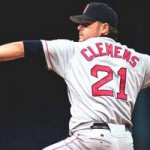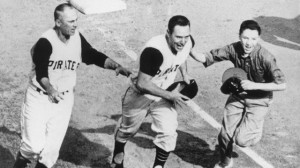So my dad calls me the other day and immediately exclaims, “What’s wrong with this team?!?”
Today, the season is 57 games old. Two months old. Almost exactly 1/3 old. And the Nationals, the supposed power houses, next-coming-of the 1927 Yankees, the possible 110 win Nationals, are a .500 team. Actually, a game under .500 with the weekend series loss to Atlanta.
We’ve talked about the Nats early schedule (as has Tom Boswell recently), chock full of 2012 playoff contenders. But 2013 is a new season and in reality the Nats as of two months in have played the 14th ranked schedule of 30 teams (3 days ago it was 19th ranked … so these rankings move fast). We’ve talked about the injuries, the offense in general, defense, the bench, Drew Storen, Danny Espinosa, and Dan Haren all as contributing factors. A couple of prominent national baseball writers pipped in on 5/31/13 on this topic: Jay Jaffe on si.com and then Rob Neyer on BaseballNation.com, offering some suggestions, possible trades (Ian Kinsler?) and possible call-ups (the obvious Anthony Rendon).
But here’s my scary thought, as proposed to my dad. What if .500 is exactly what this team is?
The 2011 Nationals finished .500. The 2012 Nationals surprised us all and won 98 games. Now the team is back to its 2011 levels. Is it possible that this was always a .500 team for whom everything went perfectly right in 2012? All the stars were in alignment in 2012 in terms of hitting, bench play and coming out parties for guys like Ian Desmond and Bryce Harper and Gio Gonzalez. Now in 2013 are we just seeing all these guys revert to their normal production levels?
Were we just spoiled by the amazing bench production we got last year? Here’s a quick table (stats as of 5/31/13):
| player | 2012 OPS+ | 2013 OPS+ | Career OPS+ |
| Bernadina | 113 | 34 | 85 |
| Moore | 125 | 27 | 90 |
| Lombardozzi | 83 | 55 | 74 |
| Tracy | 112 | 19 | 97 |
In other words, all four primary bench guys outperformed their career OPS+ values (mostly by a 25-30% factor) in 2012, and now all four guys are hitting so far below replacement level as to be drastically hurting the club.
I think the answer to the above questions goes along the following, topic by topic:
- No, this is better than a .500 team. The 2013 team is absolutely better than the 2011 team that rallied in September to finish 80-81. The rotation now is leaps and bounds better than the 2011 rotation. The offense (on potential anyway) is better.
- This team is by-and-large the exact same team as the 2012 98 win team. You can quibble about the loss of Michael Morse‘s charisma and power versus the fire-starting abilities of Denard Span at the top of the order, but then you also have to acknowledge the runs-saved so far this season by having an additional plus-plus defender in the outfield. Haren versus Edwin Jackson? At least a wash. Bullpen additions and subtractions? Perhaps replacing Burnett, Gorzelanny and Gonzalez with just Zach Duke and Rafael Soriano has weakened the bullpen. Perhaps not, considering Soriano’s pedigree as a closer and its cascading effect on the rest of the bullpen.
- The bench over produced in 2012 and is underproducing thus far in 2013, per career averages. A bit of expected regression to the mean should indicate rising bench offensive production from here on out. It almost has to; there’s just no way that these four guys are going to hit THIS badly the rest of the season.
But, the early season damage as been done. At this point, just for the team to match its 2012 win total they’d have to finish the season 70-35. That’s a .667 winning percentage. That’s a 110-win pace for a season. The NL Central right now has three teams with better records than either Atlanta or Washington, the two pre-season NL favorites, meaning there may not even be a NL Wild-Card to fall back on. This team needs to focus on winning the division or there may not be an October.
This sounds like something Yogi Berra would say, but here goes: you have to score to win. For me, if they start scoring runs and out-hitting teams, the issues we have with defense, the bullpen and injured starters will become secondary concerns. As we speak, these Nationals are hitting .229 AS A TEAM. That’s unbelievable. Almost amazingly bad. They’re 28th in batting average. They’re dead last in team OBP (on a pace for a modern seasonal low OBP in fact), 27th in team slugging, 29th in wOBA and 28th in wRC+.
They need Werth back in the middle of the order. They need a healthy Harper, who hasn’t been the same since the LA wall crash but really hasn’t been the same since hitting the wall in Atlanta in late April (from a tweet by Mark Zuckerman: Bryce Harper’s stats before April 29 collision in ATL: .356/.437/.744. His stats since: .183/.315/.350). They’re finally getting LaRoche back on track, and Zimmerman is hitting well. They need to stop giving at bats to Espinosa, and they need Ramos back to help spell Suzuki (he’s catching nearly every game and his offense has bottomed out in the last month).
I’m going under the assumption, by the way, that Strasburg misses at most one start and that Detwiler returns straight away. I don’t think Nathan Karns is ready for the big time and the team needs to find another spot starter in the short term (Stammen?).
June is here; a weak schedule and an opportunity to get some wins. If we’re still .500 on July 1st, then we’ll probably have run out of excuses and decided that we are who we are.


